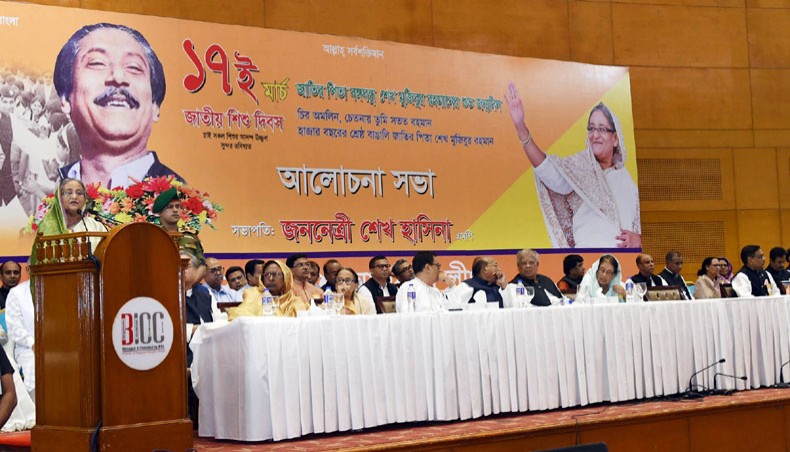1975 carnage delayed Bangladesh’s graduation to developed nation: PM
Prime minister Sheikh Hasina on Sunday said Bangladesh could have been a developed nation in 10 years after independence if the country’s founding president, Sheikh Mujibur Rahman, was alive as the country was witnessing a massive development campaign under his leadership until 1975.
Addressing a discussion on Sheikh Mujibur Rahman, the premier said the country joined the club of least developed countries in three years of independence but it took 47 years to become a developing nation.
‘If Bangabandhu was alive Bangladesh would have achieved the goal of (becoming the developing nation) goal within five years and by ten years the country would have been a developed one,’ she said.
The premier said that Sheikh Mujib founded Bangladesh, setting up all the basic structures required for its economic, cultural and political fronts.
Awami League staged the discussion to mark Sheikh Mujibur Rahman’s 98th birthday and National Children Day at Bangabandhu International Conference with Sheikh Hasina in the chair being the party’s president as well.
She said Awami League’s 2014 installation to power enabled it to earn the status of a developing nation but ‘our development process would have been spoiled if the Bangladesh Nationalist Party and its cohorts could make their way to power’.
‘It (BNP-Jamaat’s installation) would have smashed the dream of our economic progress,’ the premier said.
Sheikh Hasina urged the party leaders and workers to work together to make Bangladesh a middle income country by 2021 and a developed one by 2041.
Jatiya Sangsad deputy leader and Awami League presidium member Sajeda Chowdhury, party’s advisory council members Amir Hossain Amu and Tofail Ahmed, presidium members Syed Ashraful Islam, Matia Chowdhury, Abdul Matin Khasru and MA Mannan, general secretary Obaidul Kader, noted artist Hashem Khan and literateur Selina Hossain took part in the discussion.
Publicity secretary of the party Hasan Mahmud conducted the discussion.
The prime minister said the very birth of Sheikh Mujib necessitated the emergence of independent Bangladesh.
Sheikh Hasina said that Sheikh Mujib never celebrated his birthdays with mirth and merriment as his people were living under poverty and distress. After 1948 he passed most of his birthdays in prison.
The prime minister said since 1948, Mujib was preparing his people for independence defying all pressures, intimidations and threats of the Pakistani rulers. Mujib was repeatedly put behind the bars, but nothing could stop him from heading towards his goal, she added.
Sheikh Hasina said people of Bangladesh were completely unsafe and unprotected during Indo-Pak war in 1965, after which Mujib piloted the six-point demand.
‘Pakistani rules had hatched conspiracies to kill him in Lahore after floating the six-point demand. But, he succeeded in returning home with the help of some of his close friends,’ she said.
Sheikh Hasina said Bangabandhu united the whole nation to press home the six-point demand. She pointed out that he had come to realise that the Pakistanis would not handover power even if the Awami League could win in the 1970 election.
Mujib also saw that the nation’s liberation was not possible without war with Pakistan, she said adding that he had decided to take part in the election as part of his movement and to make it clear steadfastly who would lead the Bengali nation.
After his release in the Agartala Conspiracy Case, Sheikh Hasina said, Mujib visited London immediately after his release to take final decisions about the course of action in case of a war against Pakistan as well to get the support of India and other countries.
In 1970, the prime minister said the Pakistani rulers backed a 20-party alliance in the general election and hoped the alliance to win at least 20 to 30 seats. The Awami League candidates won in all seats except for two as predicted by Mujib, she added.
Sheikh Hasina said Mujib had taken every step forward very carefully in his long struggle to independence and been aware that any wrong step could impede the peoples’ aspirations.
The prime minister said Mujib had a deep faith in people and democracy. To respect his belief in democracy, he had gone for an early election despite the fact that no country went to hold general elections under such a situation.
‘But, it was Bangabandhu who gave the general election within one year of independence as per the new constitution, which bore testimony to his faith in democracy,’ she said.
News Courtesy: www.newagebd.net











